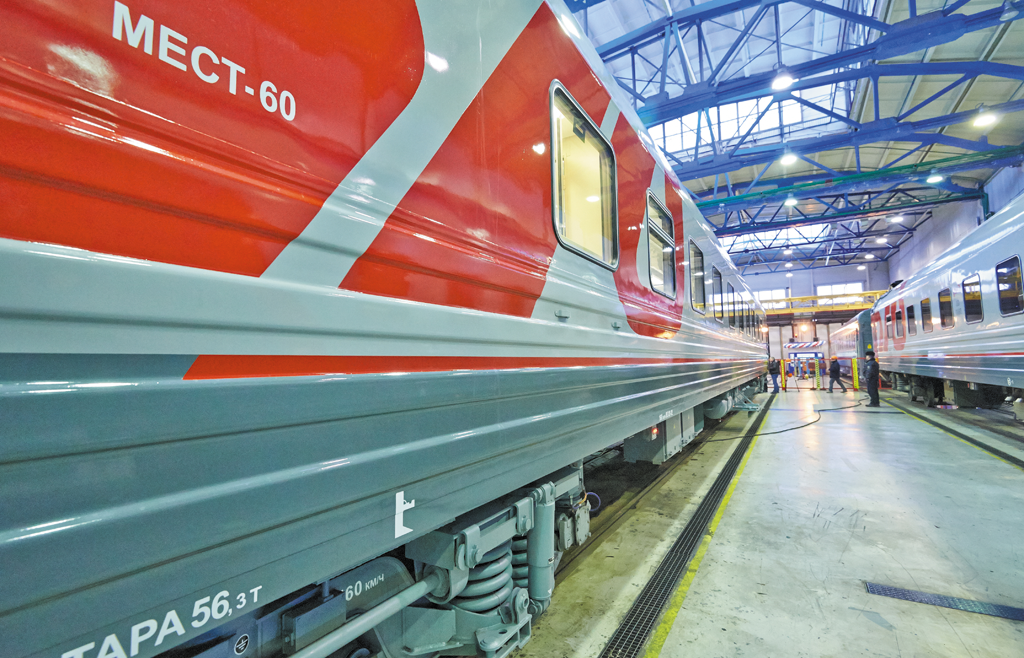



In 2012, the Company performed an energy analysis of its holdings and as a result approved the Programme for Energy Conservation and Improvement of Energy Efficiency at JSC FPC in
By order
In the reported year, taking into account hot water supply, 76 passenger car depots and stations were equipped with new, modern appliances. Their installation allows for the calculation of water by its actual cost. In 2014, further equipping of new appliances at 28 steam metering points is planned.
In 2013, the energy usage methods for processing boiling water system paths and associated heat and water systems at passenger car depots and stations allowed for a 150% increase in heat production while reducing fuel consumption by up to 34% and reducing operating costs by RUB 10 million.
In the reported year, 20 passenger cars were equipped with additional, automatic radiant heat systems which allow for an increase in heat quality and the creation of a comfortable micro-climate for passengers while at the same time economising energy by more than 30%. Further equipping of the rolling stock fleet with such systems is planned after the completion of the manually-controlled car update in 2014.
In 2014, the Company plans to complete the reconstruction of the Moscow-Kiev passenger car depot with the installation of modern LED lighting systems which will appreciably lower energy consumption and provide a comfortable work environment for employees.
To ensure a uniform policy for the planning and spending of fuel and electricity, saving working hours and improving the quality of managerial decision-making based on the reception of operational information, the Company has planned to develop automated energy resource control systems in 2014 (Industrial Control Systems of Fuel and Energy Resources).
The Company’s actions as regards environmental protection are carried out in accordance with the laws of the Russian Federation and the Ecological Strategy of JSC RZD. The strategy provides for a reduction of negative impact on the environment by 35% by 2015 and by 70% by 2030.
The reduction of technological impact shall be achieved via modernisation of rolling stock and civil engineering structural subdivisions.
In order to prevent the contamination of railroads and to support a clean infrastructure, only new train cars installed with ecologically clean toilet systems (ECTS) shall be purchased. At the same time, such systems shall be installed in currently-operating train cars when they undergo major repairs.
The Company continues to re-equip its rolling stock with boilers which use pellet fuel that significantly reduces harmful emissions. As of the reported year, there are 508 such units in service. The programme is also being implemented via the purchase of passenger rolling-stock with centralised power supplies. As of the end of 2013, the quantity of such train cars amounted to 467 units.
Water usage in 2013, including for production needs, remained at 2012 levels and amounted to 9.233 million cubic meters.
In 2013, the Company’s structural units produced 5,068.6 thousand cubic meters of wastewater, including 4,992.6 thousand cubic meters discharged into sewage networks (of which 76.5% met the quality agreed to in the contract) and about 76 thousand cubic meters into the environment (of which 80.7% were clean as per regulations).
Air pollutant emissions in 2013 amounted to 7.33 thousand tons, a 4.9% decrease from the previous year.
The volume of waste generated in 2013 decreased by 0.3% as compared to 2012 due to lower domestic solid waste and the outsourcing of part of production.
The Company’s investments in projects with direct or indirect environmental effects amounted to about RUB 720 million.
To reduce discharges that negatively impact centralised sewer systems and the environment, the Company develops annual programs to reconstruct treatment facilities and train car washing complexes with equipment for their closed water system and local treatment facilities.

The following work was also carried out in 2013:
The Company has developed special Regulations on interactions between JSC FPC and Office of the Federal Service for the Supervision of Consumer Rights Protection and Human Welfare in Rail Transport and with other agencies involved in detecting radioactive substances and other sources of ionizing radiation and highly hazardous substances in international train service.